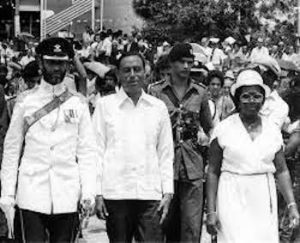
*On this date in 1981, Belize gained independence from Britain. Its history dates back thousands of years.
The Maya civilization spread into Belize between 1500 BC and 1200 BC and flourished until about 1000 AD. Several Maya ruin sites reflect that period's advanced civilization and much denser population. Spanish conquistadors and missionaries made the first recorded European invasions in the region in the 16th century. One area attraction was the availability of timber, which also brought British invaders. The earliest reference to African slaves in the British settlement appeared in a 1724 Spanish missionary's account, which stated that the British had recently been importing them from Jamaica, Bermuda, and other Central American British Colonies.
A century later, the total slave population numbered about 2,300. Most slaves were born in Africa, and many slaves at first maintained African ethnic identifications and cultural practices. Gradually, however, slaves assimilated, and a new, synthetic Kriol culture was formed. Slavery in the settlement was associated with the extraction of timber because treaties forbade the production of plantation crops. As the trade shifted to mahogany in the last quarter of the 18th century, the slave owners needed more money, land, and slaves for large-scale operations. The chattel slave experience, though different from that on plantations in other regional colonies, was oppressive. They were frequently the objects of "extreme inhumanity," as a report published in 1820 stated.
In the 18th century, many slaves escaped to Yucatán, and in the early 19th century, a steady flow of runaways went to Guatemala and Honduras. One way the settler minority maintained its control was by dividing the slaves from the growing population of free Kriol people who were given limited privileges. In the early 19th century, the Garifuna, descendants of indigenous people and Africans who escaped slavery, arrived in the settlement. The Garifuna had resisted British and French colonialism in the Lesser Antilles until they were defeated by the British in 1796. After putting down a violent Garifuna rebellion on Saint Vincent, the British moved between 1,700 and 5,000 of the Garifuna across the Caribbean to the Bay Islands (present-day Islas de la Bahía) off the north coast of Honduras.
From there, they migrated to the Caribbean coasts of Nicaragua, Honduras, Guatemala, and the southern part of present-day Belize. By 1802, about 150 Garifuna had settled in the Stann Creek area and were engaged in fishing and farming. Other Garifuna later came to the British settlement of Belize after finding themselves on the wrong side in a civil war in Honduras in 1832. The act to abolish slavery throughout the British colonies passed in 1833, was intended to avoid drastic social changes by effecting emancipation over a five-year transition period, by implementing a system of "apprenticeship" calculated to extend masters' control over the former slaves, and by compensating former slave owners for their loss of property.
After 1838, the settlement masters continued to control the country for over a century by denying access to land and limiting freedmen's economic freedom. At the same time, the settlement was grappling with the ramifications of the end of slavery and the ethnic group, the Garifuna. Many Garifuna men soon found wage work alongside slaves as mahogany cutters. In 1841, the Garifuna's largest settlement, Dangriga, flourished. The British treated Garifuna as squatters. In 1857, the British told the Garifuna that they must obtain leases from the crown or risk losing their lands, dwellings, and other buildings.
Belize was not formally termed the "Colony of British Honduras" until 1862. It became a crown colony in 1871. Several constitutional changes were enacted to expand representative government. The 1872 Crown Lands Ordinance established reservations for the Garifuna and the Maya. The British prevented both groups from owning land and treated them as a source of valuable labor. Internal Self-Government was granted in January 1964. The territory's official name was changed from British Honduras to Belize in June 1973, and full independence was granted on September 21, 1981.